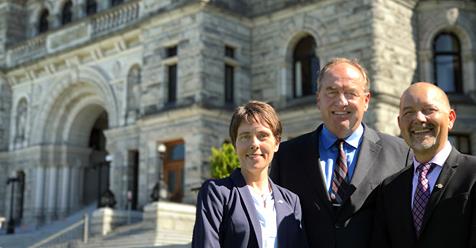Media Release
New property transfer data requirements show it’s time to close bare trust loophole
Today the government announced that it was taking steps to collect data to ensure transparency of ownership of properties purchased through a corporation or a trust. As I note in the media release below, improving data collection and transparency is a good first step, but the province should proceed with applying property transfer tax to the transfer of beneficial ownership. Doing so would plug a loophole that lets corporations and wealthy individuals avoid paying BC’s property transfer tax.
It’s been almost five years since I began urging government to close this so-called bare trust loophole as was done in Ontario many years ago. Doing so is one of the most important steps government can take to crack down on speculative activity in the housing market.
Finally, and coincidentally, Great Britain announced similar measures today for offshore buyers. But in the UK case, stiff penalties and even jail sentences are being proposed if people “fail to register or attempt to file false information“.
Media Release
New property transfer data requirements show it’s time to close bare trust loophole: Weaver
For immediate release
July 25, 2018
VICTORIA, B.C. – Andrew Weaver, leader of the B.C. Green Party, says the government’s move to collect information on beneficial ownership of properties underscores the immediate need to close the bare trust loophole. Bare trusts allow for the transfer of beneficial ownership within trusts. Since no title change occurs, no property transfer tax (PTT) is paid.
“This data collection is a good first step, but the province should proceed with applying property transfer tax to the transfer of beneficial ownership,” said Weaver.
“Speculation is a major driver of the housing affordability crisis. The bare trust loophole incentivizes speculation. Preventing individuals and corporations from using it to avoid paying taxes is low-hanging fruit and should be dealt with immediately. Applying the PTT to beneficial ownership has been done in Ontario and is what is needed to close this loophole once and for all.”
Weaver has called for the closure of the bare trust loophole since 2015. The government first announced its intention to collect additional data on beneficial ownership in the February provincial budget. Today, it announced that it will begin the data collection on September 17, 2018.
-30-
Media contact
Jillian Oliver, Press Secretary
+1 778-650-0597 | jillian.oliver@leg.bc.ca
Findings of fish processing compliance audit show need for reform
The BC Government today released the Fish Processing Facilities Compliance Audit Report that was commissioned following findings by Tavish Campbell that effluent containing the Piscene Reovirus (so-called “blood water”) was being discharged from a BC fish processing facility.
This issue was explored by my colleague Sonia Furstenau during question period late last year:
The report provides a clear illustration of the type of problems that have arisen from the previous BC Liberal administration’s severe cutbacks to compliance and enforcement initiatives within government.
As the Minister of Environment and Climate Change Strategy noted in the government’s statement accompanying the report’s release:
“The industry has been largely operating under an outdated permitting regime, going back several decades. We are taking immediate steps to ensure permits are updated and strengthened at fish processing facilities throughout B.C.”
Between ICBC, money laundering, the housing crisis and a litany of environmental disasters, it’s increasingly clear that the previous government badly mismanaged our province.
Government has a responsibility to ensure the public interest by proactively updating laws and regulations to fit changing realities. Instead, the previous government left British Columbians with mounting debts while they pillaged the public books and turned a blind eye to harmful activities. We have taken significant steps to remedy this, including banning big money and reforming the lobbying industry, but we must take every opportunity in this minority government to clean up B.C. to prevent such blatant misuse of power.
Below I reproduce the media statement that the BC Green caucus issued in response to government’s release of the report.
Media Release
Findings of fish processing compliance audit show need for reform: B.C. Green caucus
For immediate release
July 4, 2018
VICTORIA, B.C. – The B.C. Green Caucus is calling on government to step up marine monitoring and protection in the wake of an audit of fish processing facilities. Andrew Weaver, leader of the B.C. Green Party, says the report shows a disturbing pattern of widespread mismanagement by the previous B.C. Liberal government that must be addressed.
“Between ICBC, money laundering, the housing crisis and a litany of environmental disasters, it’s increasingly clear that the previous government badly mismanaged our province,” said Weaver. “Government has a responsibility to ensure the public interest by proactively updating laws and regulations to fit changing realities. Instead, the previous government left British Columbians with mounting debts while they pillaged the public books and turned a blind eye to harmful activities. We have taken significant steps to remedy this, including banning big money and reforming the lobbying industry, but we must take every opportunity in this minority government to clean up B.C. to prevent such blatant misuse of power.”
Sonia Furstenau, environment spokesperson, added that the findings show why government should adopt Mark Haddock’s recommendations to reform the professional reliance model.
“As the previous government cut the funding needed to fulfill government’s duty to protect the public interest, they saddled our province with completely avoidable messes,” said Furstenau. “Many British Columbians were horrified, like I was, to see Tavish Campbell’s videos of blood water effluent that prompted this audit. It is no wonder people don’t trust the process when we must rely on private citizens and the media to bring such serious issues to light. Adopting Mark Haddock’s recommendations – and the ministry’s recommendations following this audit – will go a long way to restoring the public’s trust that government is looking out for their health and safety, as well as the long-term sustainability of our natural resource sector.”
Adam Olsen, spokesperson for agriculture, said the findings underscore the litany of threats facing B.C.’s wild salmon and added the release of infected blood from farmed fish is another reason why the government should keep its promise to transition away from open-net pen finfish aquaculture.
“Wild salmon are culturally, economically and environmentally essential to our province, yet we are allowing them to be hit at every stage of their development,” said Olsen. “Now we learn they have also been exposed to ‘acutely lethal’ levels of effluent.”
DFO’s 2018 salmon outlook for B.C. states that of 91 different groupings of salmon, only 28 are expected to be at or above the amount necessary for a healthy population.
“This is absolutely unacceptable – we can and we must do better if we want our grandchildren to live in a province with wild salmon,” added Olsen.
-30-
Media contact
Jillian Oliver, Press Secretary
+1 778-650-0597 | jillian.oliver@leg.bc.ca
German report demonstrates need for systemic change, investigation into links with real estate sector
The BC Government today released Peter German’s long awaited report on money laundering in Lower Mainland casinos.
The report, entitled Dirty Money: An Independent Review of Money Laundering in Lower Mainland Casinos conducted for the Attorney General of British Columbia, demonstrates systemic failure within the previous government to adapt our laws and regulations to changing realities.
Below is the media release we issued in response to the report’s release.
Media Release
Weaver: German report demonstrates need for systemic change, investigation into links with real estate sector
For immediate release
June 26, 2018
VICTORIA, B.C. – Andrew Weaver, leader of the B.C. Green Party, welcomed Dr. Peter German’s independent review of money laundering in Lower Mainland casinos. Weaver says that German’s finding that large-scale transnational money laundering has been occurring in our casinos, and that B.C.’s laws and regulations have not kept pace with changing realities, demonstrates the need for wholesale policy change.
“Dr. German’s report demonstrates systemic failure within the previous government to adapt our laws and regulations to changing realities,” said Weaver.
“We have seen significant growth and change, both in B.C. and globally, since many of our laws and regulations were first developed. Outdated policies have left our province vulnerable to exploitation as transnational criminal entities have become increasingly more sophisticated.
“It is encouraging to hear that recent government actions have led to a significant reduction in suspicious activity in B.C. casinos, and I am pleased that the Attorney General has accepted the recommendations. What is most important now is that government provide clear timelines for implementing the recommendations and is transparent with regards to progress. In particular, the recommendation that the Province undertake research into allegations of organized crime penetration of the real estate industry should be at the top of government’s agenda. British Columbians are looking for answers as to why our housing market spiralled out of control so quickly and if we are to develop effective solutions we must undertake a thorough investigation of this issue.
“Government cannot be asleep at the switch amidst such significant threats. Going forward, government must be significantly more proactive in modernizing our laws and regulations so that we are not faced with such a crisis again.”
-30-
Media contact
Jillian Oliver, Press Secretary
+1 778-650-0597 | jillian.oliver@leg.bc.ca
Modernizing & streamlining government’s procurement process: an opportunity for innovation
Today, the Ministry of Citizens’ Services announced that it is modernizing and streamlining the government procurement process in order to better support BC businesses.
I welcome this initiative, which we also called for in our election platform, but in my view all government supports for small businesses and entrepreneurs should be modernized to respond to the changing needs of business and to ensure that we are doing everything we can to support these innovative British Columbians.
Below is the media release we issued in response to the government’s announcement.
Media Release
Weaver welcomes new government procurement process, calls for comprehensive streamlining of support for innovators
For immediate release
June 25, 2018
VICTORIA, B.C. – Andrew Weaver, leader of the B.C. Green Party, welcomed government’s announcement that it is streamlining procurement to better support B.C. innovators. Weaver added that the government should streamline and modernize all supports for B.C. small businesses and innovators.
“This is a good first step towards supporting B.C. innovators and demonstrates why government should streamline and modernize all support for entrepreneurs,” said Weaver.
“Government needs to be a leader in ensuring that we are invested in the success of B.C. companies. One of the biggest challenges I hear from small businesses and start-ups is that government programs and support initiatives are disparate and cumbersome to navigate. Additionally, business models and the needs of entrepreneurs are evolving due to the changing nature of our economy. Government procurement is an important piece of the puzzle, but there are many other programs that help businesses grow. By ensuring that government programs are responsive to the changing needs of business and making them easier to navigate, we can ensure we are providing useful, efficient support for our homegrown innovators.
“Innovation-driven industries, be they in clean tech, high tech or value-added resources, are undoubtedly the future of B.C.’s economy. Not only are these industries leading the global economy, they provide well-paying jobs and are compatible our province’s strategic strengths and values. I am pleased that key elements of our economic plan to support these industries, the Innovation Commission and the Emerging Economy Task Force, have been adopted by the B.C. NDP government through our Confidence and Supply Agreement. I look forward to continuing to work closely with government to support the development of a thriving, innovative 21st century economy.”
-30-
Media contact
Jillian Oliver, Press Secretary
+1 778-650-0597 | jillian.oliver@leg.bc.ca
Statement on beneficial ownership registry white paper
The BC Government announced today that it plans to create a publicly accessible beneficial ownership registry in an attempt to ensure transparency as to who owns property in British Columbia.
It’s been more than four years now since I started calling on government to close the bare trust loophole which is being exploited to provide cover for anonymous real estate transactions as well as to avoid paying property transfer and, potentially, capital gains taxes.
A bare trust is a legal entity that allows for the separation of beneficial and legal ownership. The beneficial owner of a property is the person or persons who make all the decisions concerning such things as rent, repairs, management, sale etc.; they are also the person or persons who receive all the revenue from and arrange financing for the property. The trustee of the bare trust has no substantive decision-making capacity as they simply act upon the instructions of the beneficial owner. Typically the trustee is a corporation that has no other purpose but to act as a trustee for the bare trust and for which the beneficial owner owns all the shares.
Now here’s the loophole. Suppose you own a home or apartment building that you want to dispose of. If you simply transferred title, like most of us do when we sell a home, the purchaser would have to pay the property transfer tax.
But if instead the property is in a bare trust where the trustee is a company, then you will pay no tax. All you have to do is sell your shares in the company for 1$ (the company has no assets anyway), and sell the “beneficial ownership” rights of the property to a third party via a “bare trust agreement” which is not registered at the Land Title Office. Since no change in title occurs, no tax is paid.
While I appreciate that government is now collecting data on beneficial owners and sharing that data with the Canadian Revenue Agency (thereby potentially giving the CRA the ability to crack down on capital gains evasion), the government is still not doing what Ontario did ages ago. That is, to apply the property tax to transfer of beneficial ownership rather that to transfer of title.
This is perhaps the single most effective measure the government could take to clamp down on speculation in BC’s real estate sector.
Below is the press release I issued following the government’s announcement.
Media Release
Andrew Weaver statement on beneficial ownership registry white paper
For immediate release
20 June 2018
VICTORIA, B.C. – Today Andrew Weaver responded to government’s release of proposed legislation to create a beneficial ownership registry.
“Government should match its data collection and transparency efforts with decisive action and immediately close the bare trust loophole,” said Weaver.
“I welcome the collection of more information on who truly owns property in B.C. For far too long, individuals and corporations with the means to navigate the holes in our legal system have been able to shield their identities from tax collection and law enforcement officials. However, it is critical that in addition to collecting more data, government acts decisively to actually crack down on people who use beneficial ownership structures in order to avoid paying taxes.
“Right now, speculators are able to use the bare trust loophole to avoid paying millions of dollars in taxes. This is a loophole so big you could drive a bus through it. Government can close it by simply applying the property transfer tax to the transfer of beneficial ownership. By doing so, government can truly crack down on speculation, tackle tax avoidance and free up huge sums of money that the province can spend on housing affordability.
“I will continue to push government on the urgent need to close the bare trust loophole.”
-30-
Media contact
Jillian Oliver, Press Secretary
+1 778-650-0597 | jillian.oliver@leg.bc.ca






